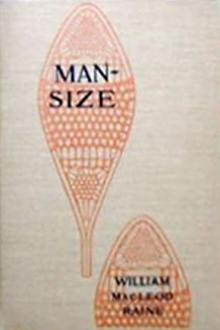Laughing Bill Hyde and Other Stories by Rex Beach (ebook smartphone .TXT) 📗

- Author: Rex Beach
Book online «Laughing Bill Hyde and Other Stories by Rex Beach (ebook smartphone .TXT) 📗». Author Rex Beach
"I've had a hard fight for you, old man," the doctor explained. "I couldn't leave you here to die."
"I guess I must 'a' been pretty sick."
"Right! There's no hospital here, so I took this cabin—borrowed it from the Company. We don't burn much fuel, and expenses aren't high."
"You been standin' off the landlord?"
"Yes."
There was a considerable silence, then Bill said, fervently: "You're a regular guy, like I told you! But you got your pill business to attend to. I'm all right now, so you better blow."
Thomas smiled dubiously. "You're a long way from all right, and there's no place to 'blow' to. The last boat sailed two weeks ago."
"Last boat for where?"
"For anywhere. We're here for the winter, unless the mail-carrier will take us to Nome, or up the Yukon, after the trails open."
"I bet you'll do a good business right here, when folks see what you done for me," Bill ventured.
"Just wait till you look at the town—deserted warehouses, some young and healthy watchmen, and a Siwash village. You're the only possible patient in all of St. Michaels."
Bill lay silent for an hour, staring through the open cabin window at a gray curtain of falling snowflakes; then he shook his head and muttered:
"Well, I be danged!"
"Anything you want?" Thomas inquired, quickly.
"I was just thinking about that gal." Bill indicated the leather-framed photograph which was prominently featured above the other bunk. "You ain't gettin' ahead very fast, are you?"
This time the young medical man smiled with his lips only—his eyes were grave and troubled. "I've written her all the circumstances, and she'll understand. She's that sort of a girl." He turned cheerfully back to his task. "I found that I had a few dollars left, so we won't starve."
Mr. Hyde felt impelled to confess that in his war-bag there was a roll of some seven hundred dollars, title to which had vested in him on the northward trip, together with certain miscellaneous objects of virtu, but he resisted the impulse, fearing that an investigation by his nurse might lead the latter to believe that he, Bill, was not a harness-maker at all, but a jewelry salesman. He determined to spring that roll at a later date, and to present the doctor with a very thin, very choice gold watch out of State-room 27. Bill carried out this intention when he had sufficiently recovered to get about.
Later, when his lungs had healed, Bill hired the mail-man to take him and his nurse to Nome. Since he was not yet altogether strong, he rode the sled most of the way, while the doctor walked. It was a slow and tiresome trip, along the dreary shores of Behring Sea, over timberless tundras, across inlets where the new ice bent beneath their weight and where the mail-carrier cautiously tested the footing with the head of his ax. Sometimes they slept in their tent, or again in road-houses and in Indian villages.
Every hour Laughing Bill grew stronger, and with his strength of body grew his strength of affection for the youthful doctor. Bill experienced a dog-like satisfaction in merely being near him; he suffered pangs when Thomas made new friends; he monopolized him jealously. The knowledge that he had a pal was new and thrilling; it gave Bill constant food for thought and speculation. Thomas was always gentle and considerate, but his little services, his unobtrusive sacrifices never went unnoticed, and they awoke in the bandit an ever-increasing wonderment. Also, they awoke a fierce desire to square the obligation.
The two men laid over at one of the old Russian towns, and Thomas, as was his restless custom, made investigation of the native village. Of course Bill went with him. They had learned by this time to enter Indian houses without knocking, so, therefore, when they finally came to a cabin larger and cleaner than the rest they opened the door and stepped inside, quite like experienced travelers.
A squaw was bent over a tub of washing, another stood beside the tiny frosted window staring out. Neither woman answered the greeting of the white men.
"Must be the chief's house," Thomas observed.
"Must be! I s'pose the old bird is out adding up his reindeer. 'Sapolio Sue' is prob'ly his head wife." Laughing Bill ran an interested eye over the orderly interior. "Some shack, but—I miss the usual smell."
Neither woman paid them the least attention, so they continued to talk with each other.
"I wonder what she is washing," Doctor Thomas said, finally.
The figure at the window turned, exposing the face of a comely young
Indian girl. Her features were good, her skin was light. She eyed the
intruders coolly, then in a well-modulated voice, and in excellent
English, she said:
"She is washing a pair of sealskin pants."
Both men removed their caps in sudden embarrassment. Thomas exclaimed:
"I beg your pardon! We thought this was just an ordinary native house, or we wouldn't have intruded."
"You haven't intruded. This is 'Reindeer Mary's' house." The girl had again turned her back.
"Are you Reindeer Mary?"
"No, I am Ponatah. Mary befriended me; she lets me live with her."
"Allow me to introduce Mr. Hyde. I am Doctor Thomas. We were very rude—"
"Oh, everybody comes here." The men recognized instantly in the speaker's face, as well as in her voice, that education had set its stamp. "Will you sit down and wait for her?"
"You overwhelm us." After an awkward moment the physician queried,
"How in the world did you learn to speak such good English?"
"A missionary took an interest in me when I was a little girl. He sent me to Carlisle."
Laughing Bill had been an attentive listener, now he ventured to say:
"I know this Carlisle. He's a swell football player, or something."
Ponatah smiled, showing a row of small, white teeth. "Carlisle is an
Indian school."
"What made you come back?" Thomas inquired, curiously.
Ponatah shrugged her shoulders. "There was an end to the money. What could I do? At first I thought I'd be able to help my people, but—I couldn't. They will learn from the white people, but not from one of their own kind."
"Your parents—?"
"They died when I was a baby. Mary took me in." The girl spoke in a flat, emotionless tone.
"It must be tough to come back to this, now that you know what life really is," said Thomas, after a time.
Ponatah's eyes were dark with tragedy when she turned them to the speaker. "God!" she cried, unexpectedly, then abruptly she faced the window once more. It was a moment before she went on in fierce resentment:
"Why didn't they leave me as they found me? Why did they teach me their ways, and then send me back to this—this dirt and ignorance and squalor? Sometimes I think I can't stand it. But what can I do? Nobody understands. Mary can't see why I'm different from her and the others. She has grown rich, with her reindeer; she says if this is good enough for her it should be good enough for me. As for the white men who come through, they can't, or they won't, understand. They're hateful to me. Petersen, the mail-carrier, for instance! I don't know why I'm telling you this. You're strangers. You're probably just like Petersen."
"I know why you're telling us," Thomas said, slowly. "It's because
I—because we're not like Petersen and the others; it's because
I—we can help you."
"Help me?" sneered the girl. "How?"
"I don't know, yet. But you're out of place here. There's a place for you somewhere; I'll find it."
Ponatah shook her head wearily. "Mary says I belong here, with my people."
"No. You belong with white people—people who will treat you well."
This time the girl smiled bitterly. "They have treated me worse than my own people have. I know them, and—I hate them."
"Ain't you the sore-head, now?" Laughing Bill murmured. "You got a hundred-per-cent. grouch, but if the old medicine-man says he'll put you in right, you bet your string of beads he'll do it. He's got a gift for helpin' down-and-outers. You got class, Kid; you certainly rhinestone this whole bunch of red men. Why, you belong in French heels and a boodwar cap; that's how I dope you."
"There must be a chance for a girl like you in Nome," Thomas continued, thoughtfully. "You'd make a good hand with children. Suppose I try to find you a place as governess?"
"Would you?" Ponatah's face was suddenly eager. "Children? Oh yes! I'd work my fingers to the bone. I—I'd do anything—"
"Then I'll do what I can."
For some time longer the three of them talked, and gradually into the native girl's eyes there came a light, for these men were not like the others she had met, and she saw the world begin to unfold before her. When at last they left she laid a hand upon the doctor's arm and said, imploringly:
"You won't forget. You—promise?"
"I promise," he told her.
"He don't forget nothing," Bill assured her, "and if he does I'll see that he don't."
After they had gone Ponatah stood motionless for a long time, then she whispered, breathlessly:
"Children! Little white children! I'll be very good to them."
"She's a classy quilt," Laughing Bill said, on the way back to the road-house.
"She's as pretty as a picture, and little more than a child," the doctor admitted.
"You made a hit. She'd do 'most anything for you." The doctor muttered, absent-mindedly. "She's stood off Petersen and these red-necks, but she'd fall for you." Mr. Hyde was insinuating.
Thomas halted; he stared at his partner curiously, coldly. "Say! Do you think that's why I offered to help her?" he inquired.
"Come clean!" The invalid winked meaningly. "You're a long ways from home, and I've knew fellers to do a lot worse. You can grab her, easy. And if you do—"
Thomas grunted angrily. "I've put up with a lot from you," he said, then he strode on.
"And if you do," the other resumed, falling into step with him, "I'll bust you right where you're thickest."
"Eh?"
"I'll bust you wide open. Oh, me 'n' that gal in the leather frame had a long talk while I was sick in St. Mikes, and she asked me to keep you in the middle of the trail. Well, I'm the little guy that can do it."
"Bill!" Evan Thomas's eyes were twinkling. "I believe I'm going to cure you, after all," said he.
Late that afternoon Mr. Hyde disappeared; he did not show up until after dark.
"I been to see Lo, the poor squaw," he readily confessed. "She ain't the pure domestic leaf, she's a blend—part Rooshian, or something. Seems there was a gang of Rooshians or Swedes or Dagoes of some sort used to run this country. She says they horned into some of the best Injun families, and she's one of the 'overs.'"
"They were Russians."
"Rooshians is a kind of white people, ain't they? Well, that's how she come so light-complected. You remember she said our folks had treated her bad? It's a fact, Doc. She spilled the story, and it made a mouthful. It's like this: when Nome was struck a Swede feller she had knew staked her a claim, but she couldn't hold it, her bein' a squab—under age, savvy? There's something in the law that prevents Injuns gettin' in on anything good, too; I don't rightly recollect what it is, but if it's legal you can bet it's crooked. Anyhow, Uncle Sam lets up a squawk that she's only eighteen, goin' on nineteen, and a noble redskin to boot, and says his mining claims is reserved for Laps and Yaps and Japs and Wops, and such other furrin' slantheads of legal age as declare their intention to become American citizens if their claims turn out rich enough so's it pays 'em to do so.
"Well, Ponatah's Swede friend gets himself froze, somehow, so she has to pass the buck. Naturally, she turns to her pals, the missionaries. There's a he-missionary here—head mug of the whole gang. He's a godly walloper, and he tears into Satan bare-handed every Sunday. He slams the devil around something shameful, and Ponatah thinks he's a square guy if ever they come square, so she asks him to re-locate her claim, on





Comments (0)